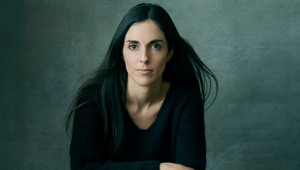
5 Minutes with… Aki Spicer

Prior to finding his calling as an ad agency strategist, Aki Spicer dabbled in music video directing, online music magazines and marketing roles in the fashion industry. None of which count as advertising ‘experience’ but all of them are rooted in the cultural zeitgeist that adland so covets.
Nowadays, Aki is chief strategy officer at Leo Burnett’s flagship office in Chicago. Recently, he has been leading the charge of forging ‘Multicultural Intelligence’, an end-to-end strategic operating system to enable Publicis agencies - and their brands - to meet multicultural consumers with more insight, understanding and creative relevance.
He was previously chief strategy officer and chief digital officer of TBWA/Chiat/Day NYC, and prior to that director of digital strategy at Fallon Worldwide spanning a career servicing clients like Nissan, Hilton, Adidas, Apple, GM, H&R Block and McDonald’s.
LBB’s Addison Capper caught up with him to find out why embedding more ‘Multicultural Intelligence’ into advertising practices is his greatest career challenge and how agency executives can learn from ‘The Lost Class’, a recent Leo Burnett creative success.
LBB> What sort of kid were you and did you have any strong opinions about advertising growing up?
Aki> I was an ‘80s nerd, geek, ‘latchkey’ kid who spent much of the time in front of the TV. I consumed books on the ‘Making of…’ movies like Star Wars and Star Trek. I scripted and directed really bad home-brew movies on an ‘80s video camcorder – think Miami Vice original episodes – shot and acted by kids in the neighbourhood with hand drawn graphics and titles. And I could appreciate advertising technique. As a kid I consumed catchy ad jingles and absorbed ‘80s graphics and animation styles. I really loved cinematic and conceptual ads such as Chanel #5, Calvin Klein Obsession, or Nike Air Jordan campaigns. Ads sell wildly impossible possibilities, and I appreciated them as a kind of entertainment and cultural signal. I was weird.
LBB> How did you become a strategist? And what were the key decisions along that route?
Aki> I was once a middling music video director who then took a detour into web music magazine publishing, and then I flirted with marketing roles in music and fashion spaces. I then spoke to a head of planning at a NYC ad agency who casually introduced me to a role called strategic planner and suggested that I would be good at it and gave me some references.
I took on some early assignments as a research ethnographer for brands. For example, I went to neighbourhood barber shops just to talk to people about their attachment to New Era caps. I went to churches to talk to women about health and eating. I went to immigrant enclaves to learn about the role of money and transferring money back home to support my family with Western Union. I lurked amongst skater enclaves to understand ‘the rules’ of the community. I lurked at bars to understand how drink trends bubbled up. I was a bit of a spy on sub-cultures – for brands. It was fun. I found that I liked to unpack how people work. I liked translating culture.
So my planner career evolved from ethnographic street research to learning how to write creative briefs and bring it all together. I found myself being very digital-leaning and I proved to be an easy-going and persuasive translator of web2 innovations that would greatly change advertising.
LBB> Can you elaborate a bit further on why you think you gravitated towards strategy once you'd found your footing in the ad industry?
Aki> I always knew of an advertising industry, but I was never formally introduced to it or invited into it throughout my early years out of college and applying to get into agencies. For a decade post-college, all my attempts to get a job at an agency were repeatedly met with rejection on grounds that ‘I had no experience’ at an agency. Even though I was working in highly creative industries and deep in culture and music marketing and fashion and club culture – the spaces that advertising coveted!
It was serendipitous that ethnographic research was my gateway into agencies. I leveraged an ability for translating the codes of subcultures and articulating the opportunity for how brands may authentically connect with folks. I guess the pivot happened for me when I followed my passion for understanding people rather than directly pursuing ‘creative’ roles.
LBB> Looking at your career, you've had a few very digital focused roles, both within strategy and more broadly. How have those roles helped and influenced the strategist you are today, in a time when ‘digital’ permeates pretty much everything?
Aki> I embrace technology. I am curious. I am entrepreneurial. I am adaptable. Embracing change is key to having a digital mindset. Acceptance that nothing remains static and new platforms usurp old. Advertising’s best eras have capitalised on change. Adland’s big idea era of the ’60s was built on a pivot to a rising new technology called television. Keeping pace with change is how we started, and it is how we will endure (if we endure).
LBB> The Lost Class is an incredible piece of work from Leo Burnett in the last year. How was that project to work on for you as the chief strategy officer?
Aki> I stand aside and insist that the teams take all the credit on the success of that effort. We agency executives were declarative about asking everyone in the agency to strive for more ‘creative bravery’ in our work. Recall that we were in a time of pandemic lockdown, and great uncertainty, and there was a conservative caution across the industry. The team was encouraged by leadership to feel boundless and supported in what they could do to solve this massive social problem. Andrew Swinand [CEO of Publicis Groupe Creative and Production U.S. and CEO of The Leo Burnett Group], particularly, was very supportive in removing barriers to enable a rather unconventional idea to happen. I am proud of the effort, the results, and proud of the team. Executives at all agencies can learn to create the space to unlock creative bravery.
LBB> What other work have you been particularly proud of recently and why?
Aki> I do much across our agency and the Publicis Groupe network to shape a strategic rigour for how we meet a rising diverse mass in our creative strategies and ideas. We call this initiative Multicultural Intelligence. This is an accelerator to evolve the creative agency processes, end-to-end, to ensure that we show up more relevantly with more insight, cultural fluency, and nuance in our work. I have also been helming this topic with the ANA AIMM (Alliance for Inclusive Multicultural Marketing) to shape industry-level guidance and best practice.
LBB> What's the knottiest strategic problem you've ever had to find an answer to and how did you work through it?
Aki> Embedding more Multicultural Intelligence into adland process is the knottiest strategic problem of my career. This has sometimes demanded invention of new products and protocols that just have not existed before in our agencies. This work has demanded holding tough, awkward, emotional conversations with brand executives and agency teams alike. It demands we try and untangle cultural baggage and hundreds of years of memory cortex to forge new agency operating systems. It has also demanded resilience and patience because organisational transformation isn’t instant and it isn’t a straight line.
A core truth of advertising is the recognition that people are rarely rational, and they rarely do things that are best for them in the long run. They often need to be persuaded. I am constantly reminded of this about adland itself. Demographics maths, business growth, consumption truths don’t always cue both individual and organisational change that is required to meet the future of a diverse mass. This kind of work has demanded that we keep the faith that it will all work out on the other side of persistence.
I channel much of my digital experience in this regard – in both shifts. From traditional to digital marketing shifts and informing the shift to meet a more diverse mass, I have tried to stay fixated on the horizon (and the data maths) and ignore the many potholes.
LBB> Data is obviously a huge driver in strategy these days - but what are your thoughts on the more human and qualitative side of research in 2022? How do you ensure that's still relevant and present?
Aki> I started on the qualitative side. I still believe in the power of meeting people in their space and trying to understand them one-to-one. I also believe in the power of data to scale one-to-one understanding. I don’t see a conflict, and I push strategists to balance both inputs.
LBB> How do you keep up to date with new insights and trends that could inform your work?
Aki> I try to stay close to culture, beyond advertising. I try to lens brands and products through the experience of real folks, so even in small ways I invite advertisers to get into real spaces where your brand or category is to understand real needs.
LBB> More generally, what's inspiring you or keeping you occupied in your downtime right now?
Aki> Through lockdown I have discovered the joys of indoor gardening. Growing a plant (or dozens of plants prolifically taking over the apartment) keeps you grounded and reminds you of simple things, simple needs. It is refreshing to get in touch with the simplest primordial truths.















